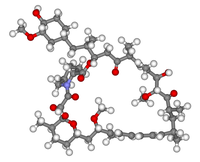
Photo from wikipedia
Although Src inhibitors are able to suppress malignant functions, their clinical outcomes are modest for the treatment of advanced prostate cancer, many of which harbor mutated PTEN. mTOR pathway is… Click to show full abstract
Although Src inhibitors are able to suppress malignant functions, their clinical outcomes are modest for the treatment of advanced prostate cancer, many of which harbor mutated PTEN. mTOR pathway is commonly hyperactivated in prostate cancer due to frequent PTEN mutation, and it is known that two mTOR complexes are both critical in prostate cancer progression. However, the functional role of mTOR kinase in Src inhibitor-mediated response remains unknown. In the current study, we combined mTOR kinase inhibitor AZD8055 and Src inhibitor dasatinib to evaluate functional behaviors in PTEN-deleted prostate cancer cells. Gene silencing was achieved by siRNA or shRNA transfection. Cell proliferation and clonogenic survival were performed by MTT and colony formation assay, respectively. “Wound-healing” scratch assay was conducted to monitor cell migration, and Matrigel-based transwell assay was applied to assess cell invasion. Protein expression was detected by Western blotting. We found that in PTEN-mt cells, C4-2B showed greater expression of p-Akt, p-S6, p-4EBP1 and p-eIF4E, all of which are mTOR complexes downstream components. Such molecular profile is consistent with functional observation that C4-2B cells are more resistant to dasatinib. Interestingly, single knockdown of either 4EBP1, S6RP or AKT showed little effects of inhibiting cell survival, while double knockdown of both 4EBP1 and AKT, cell survival was significantly inhibited. Consistently, two agents together showed significantly greater inhibition on proliferation and clonogenic survival than either single agent. Such combination effects were either additive or synergistic depending on the cell types, as reflected by combination index calculation. In addition, cell migration and invasion were inhibited in a greater extent by AZD8055 plus dasatinib, compared to either treatment alone. At the molecular level, co-targeting mTOR and Src kinases leads to strong inhibition of mTOR and Src pathways, such as FAK, Akt, S6RP and 4E-BP1. These data indicate that adding AZD8055 to dasatinib may achieve better treatment outcomes in PTEN-mt prostate cancer models. Such combination modality hold potential for future development as a novel strategy for PTEN-mutated prostate cancer patients who are less responsive to Src inhibitors. Citation Format: Yao Dai, Dietmar Siemann. Combination of mTOR kinase inhibitors with Src inhibitors in PTEN-mt prostate cancer cells [abstract]. In: Proceedings of the Annual Meeting of the American Association for Cancer Research 2020; 2020 Apr 27-28 and Jun 22-24. Philadelphia (PA): AACR; Cancer Res 2020;80(16 Suppl):Abstract nr 660.
Journal Title: Cancer Research
Year Published: 2020
Link to full text (if available)
Share on Social Media: Sign Up to like & get
recommendations!